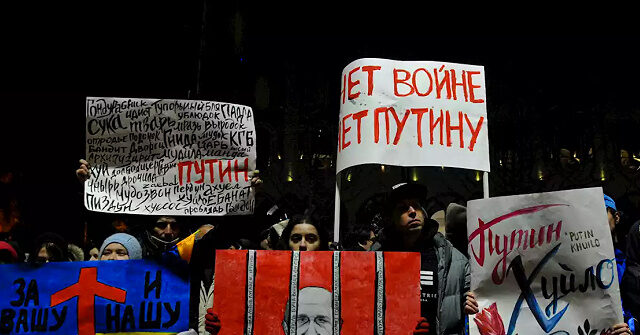The Parliament of Georgia endured hours of chaos, including a fistfight involving half a dozen lawmakers, on Monday as members debated potentially passing a law that would require certain international groups to register as foreign agents.
The law has elicited fierce opposition from anti-Russia Georgians and their representatives in the parliament, who say that the language of the law too closely resembles a similar Russian law used to smear pro-democracy groups by making them appear to be nefarious foreign actors. As members came to blows inside the parliament building, hundreds of protesters surrounded the headquarters with protest signs featuring Vladimir Putin and shouting anti-Russian slogans.
The Caucasian nation of Georgia, straddling Europe and Asia, has long endured political turbulence as a result of Russia’s influence there. Russia invaded Georgia in 2008 on behalf of separatist groups in Abkhazia and South Ossetia, two regions of Georgia that Russia rapidly moved to recognize as sovereign states. The invasion resulted in Tbilisi losing significant control of those regions to this day and preceded similar tactics by Moscow in Ukraine, where Putin recognized the “sovereignty” of two eastern regions early last year and “annexed” them, along with two other Ukrainian territories, in September.
The president of Georgia during the Russian invasion, Mikheil Saakashvili, went on to have one of the most bizarre political careers in modern history, receiving a job as governor of Odesa, Ukraine, losing his Georgian citizenship, then becoming a stateless person when he accused then-Ukrainian President Petro Poroshenko of corruption and supported his rival, current President Volodymyr Zelensky. Saakashvili has been in jail for over a year in Georgia on dubious charges of abuse of power while president.
The bill prompting the violence on Monday would require any Georgian organization that receives upwards of 20 percent of their proceeds from non-Georgian individuals and groups to register in a database of “foreign agents.” Local reports indicated that the government kept journalists from covering proceedings on the bill in person.
Clashes reported inside & outside Georgian parliament about proposed “foreign agents” legislation – to require organizations with 20+% funding from overseas to register as “foreign agents”.
Law’s protesters point out its similarity to 🇷🇺 “foreign agents” law. Dangerous trend. pic.twitter.com/O2GIS5GqPY
— Anton Gerashchenko (@Gerashchenko_en) March 6, 2023
According to Reuters, the brawling began in parliament when “the chairman of the chamber’s legal affairs committee appeared to strike the leader of the United National Movement opposition party, which opposes the bill.” Security authorities removed that leader, Levan Khabeishvili, from the chamber after the scuffle.
“They came on the orders of Anri Okhanashvili’s [chairman of the committee]; 12 people forced us to leave the room. All those who obstruct them will be forced to leave the committee meeting,” Levan Khabeishvili later said, according to the outlet Civil Georgia.
Georgian Dream, the party in power often accused of being too friendly towards Russia, supports the bill, though Georgian President Salome Zourabichvili does not.
Georgia’s Prime Minister Irakli Garibashvili does support the bill becoming a law and the legislative majority did ultimately manage to advance multiple “foreign agent” draft bills on Monday. The procedure on Monday may result in one of the bills becoming law as early as tomorrow.
The protests and brawling did result in a postponement of the ultimate step in the lawmaking process.
“Georgian society absolutely deserves to know which organizations are being financed, from which sources,” Georgian Dream lawmaker Givi Mikanadze explained in a recent television appearance. “We are talking about transparency and having an obligation (to the Georgian people).”
In contrast, opponents say that cracking down on non-governmental organizations will damage Georgia’s reputation in Europe and the West and hurt the civil rights of Georgian citizens.
“The Russian legislation that now is proposed in parliament is against Georgia’s national interests, against our European aspirations,” Irakli Pavlenishvili, a civil rights activist and opposition politician, argued, according to Reuters. “The whole international community and Georgian community is agreed on this topic”.
Garibashvili has long faced objections from detractors who say his policies are too favorable to Moscow and has attempted to straddle a line of “pragmatic” policies towards Russia. Last year, for example, his government responded to Putin’s announcement of a “special operation” in Ukraine to oust Zelensky by nominally condemning it but announcing Georgia would not sign onto any sanctions against Russia.
“We have familiarized ourselves with the actions of our international partners following the launch of military action in Ukraine, meaning economic and financial sanctions [against Russia],” Garibashvili said at the time. “I want to make it clear and unambiguous that in light of [our] national interests, Georgia does not intend to participate in financial and economic sanctions.”
The prime minister’s treatment of Saakashvili, a fervent opponent of Putin’s for decades, has also prompted condemnation. Saakashvili has spent most of his time in custody in and out of prison medical facilities, threatening and repeatedly executing hunger strikes against the government to protest his imprisonment. As of December, a doctor with access to Saakashvili reported the former president had been abused in prison and lost about 88 pounds since his detention.
Saakashvili claims he was poisoned in prison.
“I am sick not because I did not eat forcefully, but because I was poisoned,” he said in a message last year, “because I was a victim of improper treatment for many months, which has been confirmed by the world’s best experts, including Nobel Prize laureates.”
Saakashvili accused Putin of directly ordering his killing in prison in 2021.


